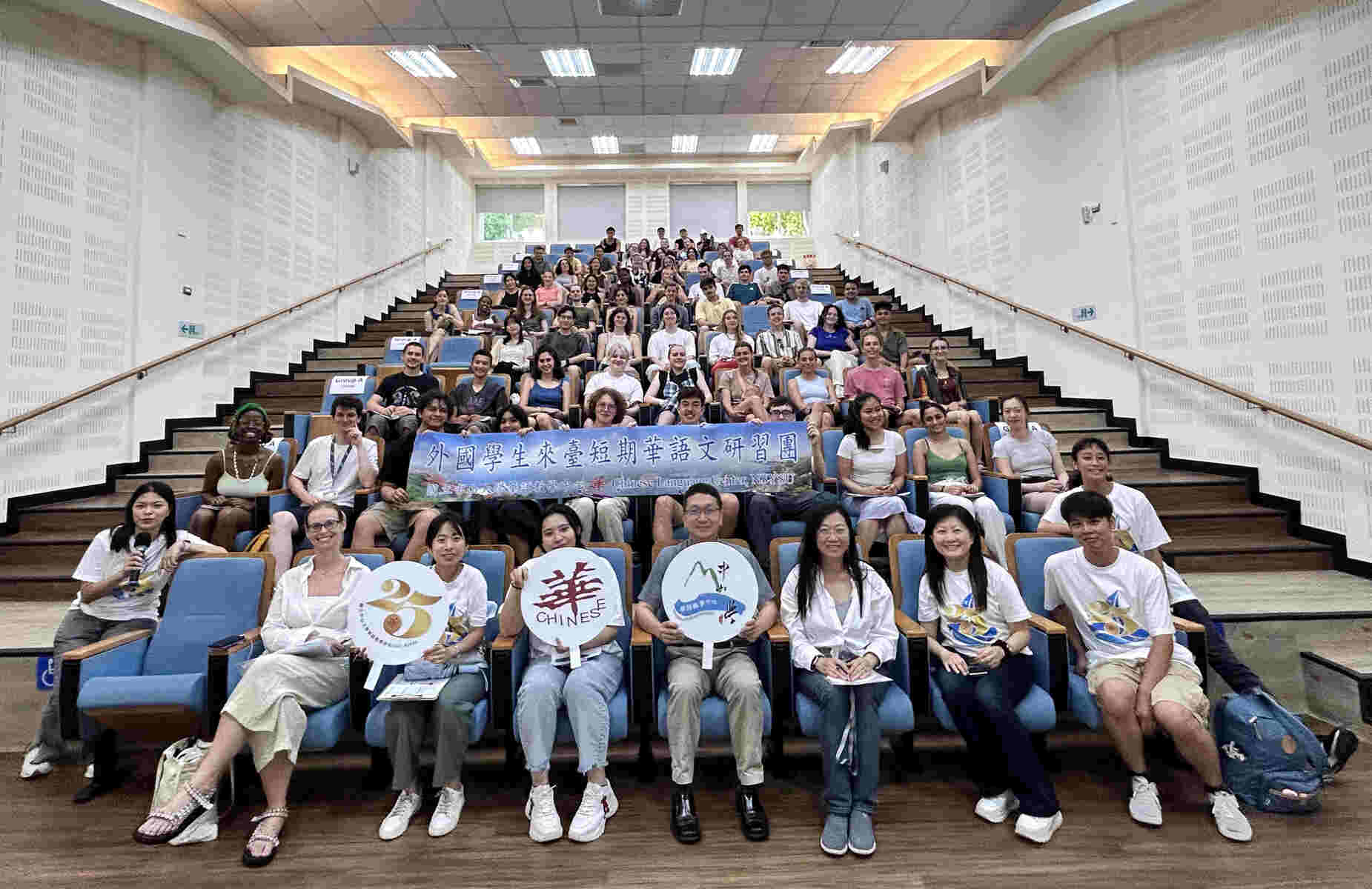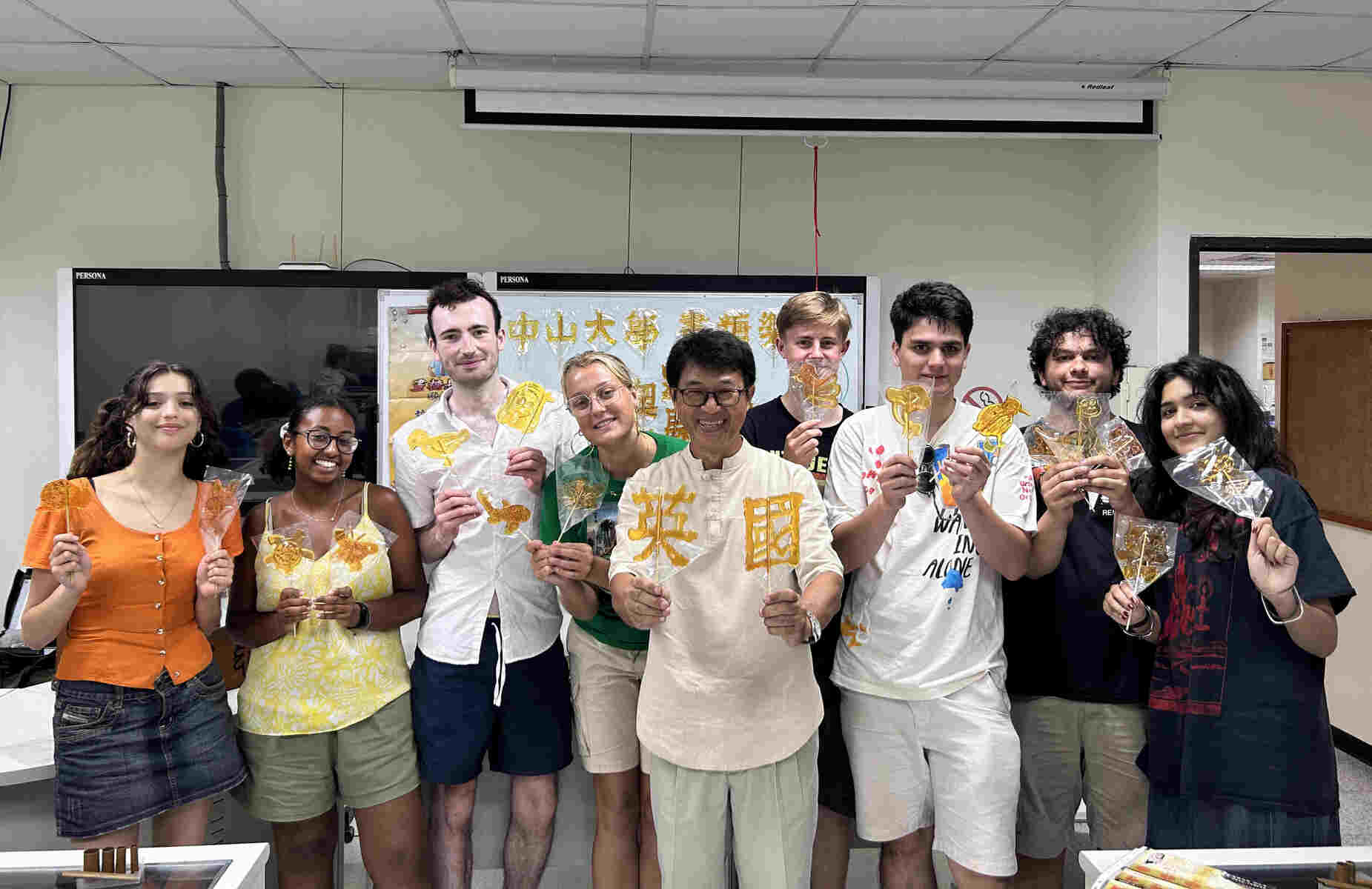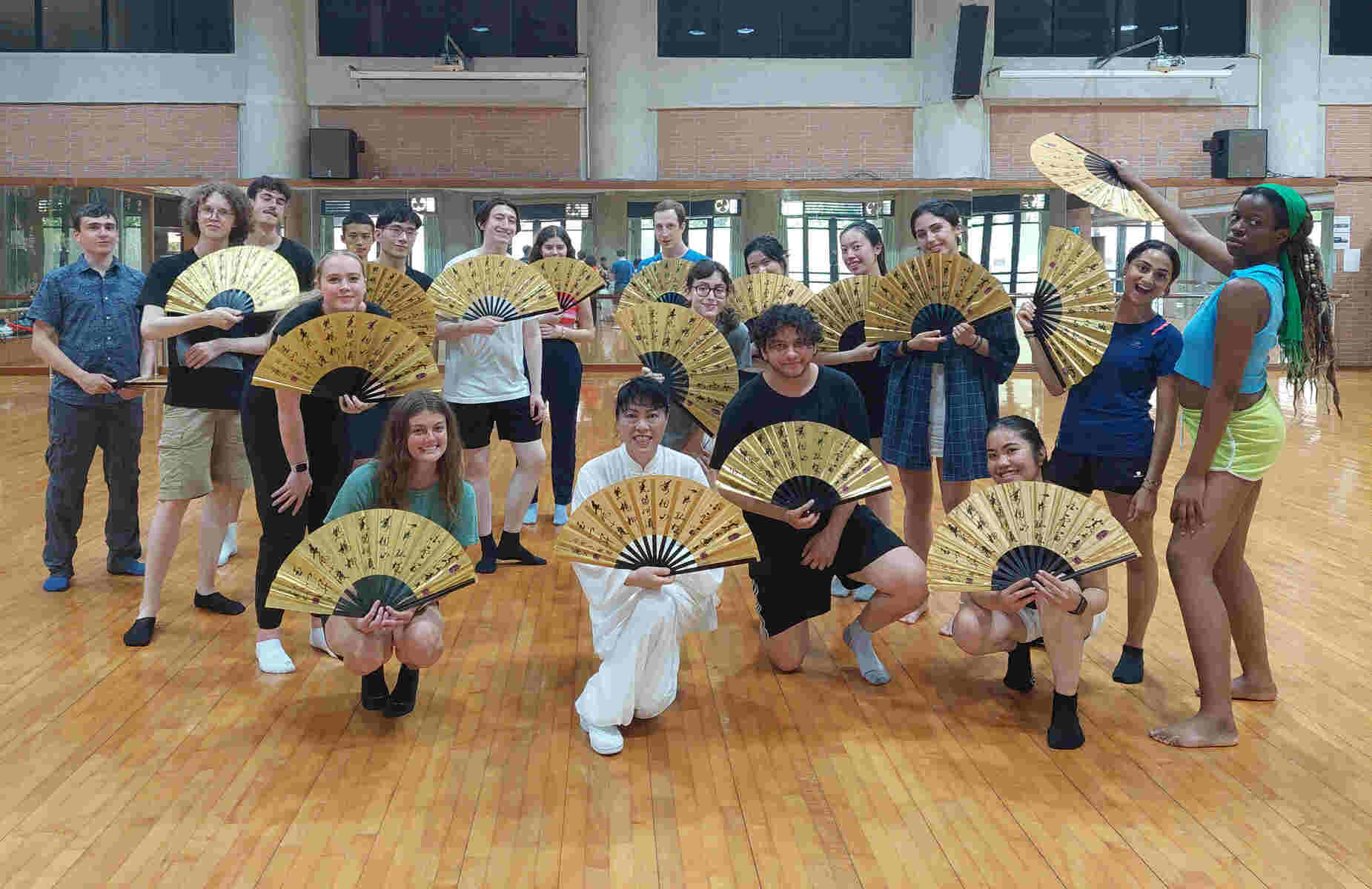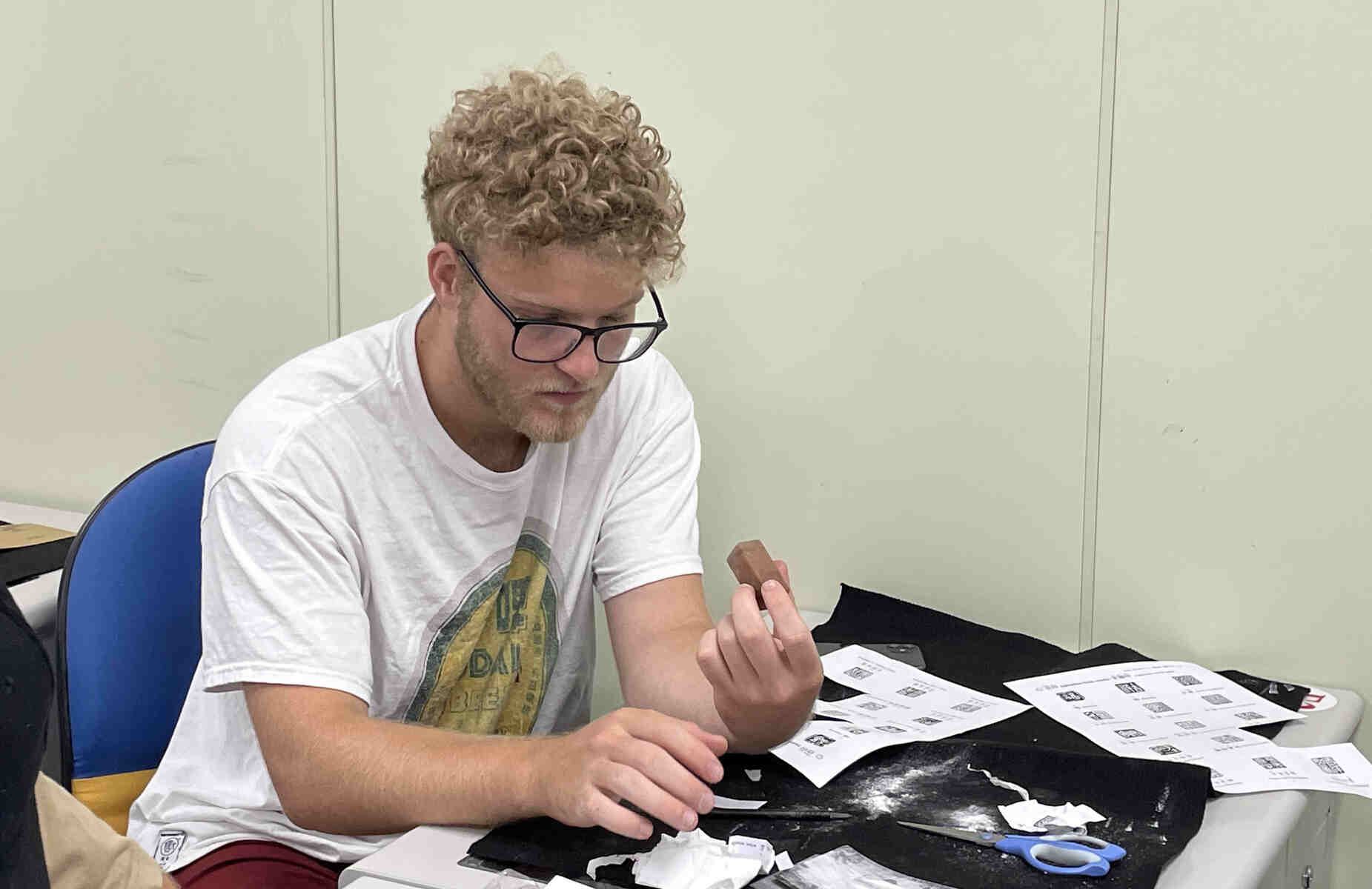The UK Turing Scheme funded University of Bristol students to study Chinese, with NSYSU being the first choice in Taiwan





2023-12-26
The United Kingdom (UK) government's "Turing Scheme" funded college groups to study Chinese in Taiwan for the first time. National Sun Yat-sen University (NSYSU) was selected as the first choice for Chinese language learning by the University of Bristol in the UK, setting a precedent in Taiwan. Twenty-eight Bristol students participating in the study abroad program started a four-week Chinese language course at NSYSU. In addition to visits and tours, NSYSU also arranged special activities for students from the University of Bristol and other countries to experience sailing, being a farmer for a day, Tai Chi, seal cutting and sugar painting. Two special lectures on "Taiwan’s Position in Asia and the World" and "The Taiwan-China Relationship" were held to give international students an in-depth understanding of Taiwan from all aspects.
NSYSU pointed out that the "Turing Scheme" was named in honor of the renowned British mathematician and computer scientist Alan Mathison Turing. It is a global program established by the UK government after Brexit in 2020. It allocates nearly £100 million each year to fund British students to study and work abroad across the globe, supporting opportunities for higher education, further education, vocational education and training, etc. The University of Bristol, the recipient of Turing Scheme funding for this collaboration, has a long history, founded nearly 150 years ago. Its highest world university ranking is 28th globally, and it has cultivated 13 Nobel laureates.
The Office of International Affairs of NSYSU stated that this Chinese language study abroad program visited NSYSU in early July. The four-week courses were arranged for 28 international students to study Chinese language courses in the morning, engage in off-campus tours, and visit cultural attractions during afternoons and weekends, including Kaohsiung’s local areas such as Cijin, Yancheng, Meinong, Liugui, Fo Guang Shan Buddha Museum, and other places, as well as the historic city of Tainan. The University of Bristol places great importance on this collaboration. Jenny French, the Centre for Study Abroad representative within the International Office of the Global Engagement Division, visited Taiwan for inspection. Taiwan's Ministry of Education also provided a scholarship subsidy of 24,000 TWD per student for the first time to those participating in the Turing Scheme, supporting outstanding international students to come to Taiwan for short-term study, creating a win-win niche for Taiwan-UK education.
NSYSU President Ying-Yao Cheng emphasized that the university has successively become the top choice for many internationally renowned universities to study Chinese in Taiwan and highly acknowledged NSYSU's dedication to Chinese language education. Taiwan and the UK have achieved international education cooperation through the Turing Scheme, providing outstanding students with valuable overseas learning experiences and allowing NSYSU faculty and students to create global connections locally. In the future, NSYSU hopes to follow this model to establish interactive relationships with educational institutions in the UK and other countries to promote more educational academic exchanges and cooperation.
Mitch Ming-Chi Chou, Vice President for International Affairs of NSYSU, mentioned that the international students were arranged to participate in activities such as sailing, Tai Chi, seal cutting, sugar painting, and the i-ride virtual reality experience. This group also included two lectures, "Taiwan’s Position in Asia and the World" and "The Taiwan-China Relationship," for the students to gain a better understanding of Taiwan and the international perspective of the Asia-Pacific region.
The United Kingdom (UK) government's "Turing Scheme" funded college groups to study Chinese in Taiwan for the first time. National Sun Yat-sen University (NSYSU) was selected as the first choice for Chinese language learning by the University of Bristol in the UK, setting a precedent in Taiwan. Twenty-eight Bristol students participating in the study abroad program started a four-week Chinese language course at NSYSU. In addition to visits and tours, NSYSU also arranged special activities for students from the University of Bristol and other countries to experience sailing, being a farmer for a day, Tai Chi, seal cutting and sugar painting. Two special lectures on "Taiwan’s Position in Asia and the World" and "The Taiwan-China Relationship" were held to give international students an in-depth understanding of Taiwan from all aspects.
NSYSU pointed out that the "Turing Scheme" was named in honor of the renowned British mathematician and computer scientist Alan Mathison Turing. It is a global program established by the UK government after Brexit in 2020. It allocates nearly £100 million each year to fund British students to study and work abroad across the globe, supporting opportunities for higher education, further education, vocational education and training, etc. The University of Bristol, the recipient of Turing Scheme funding for this collaboration, has a long history, founded nearly 150 years ago. Its highest world university ranking is 28th globally, and it has cultivated 13 Nobel laureates.
The Office of International Affairs of NSYSU stated that this Chinese language study abroad program visited NSYSU in early July. The four-week courses were arranged for 28 international students to study Chinese language courses in the morning, engage in off-campus tours, and visit cultural attractions during afternoons and weekends, including Kaohsiung’s local areas such as Cijin, Yancheng, Meinong, Liugui, Fo Guang Shan Buddha Museum, and other places, as well as the historic city of Tainan. The University of Bristol places great importance on this collaboration. Jenny French, the Centre for Study Abroad representative within the International Office of the Global Engagement Division, visited Taiwan for inspection. Taiwan's Ministry of Education also provided a scholarship subsidy of 24,000 TWD per student for the first time to those participating in the Turing Scheme, supporting outstanding international students to come to Taiwan for short-term study, creating a win-win niche for Taiwan-UK education.
NSYSU President Ying-Yao Cheng emphasized that the university has successively become the top choice for many internationally renowned universities to study Chinese in Taiwan and highly acknowledged NSYSU's dedication to Chinese language education. Taiwan and the UK have achieved international education cooperation through the Turing Scheme, providing outstanding students with valuable overseas learning experiences and allowing NSYSU faculty and students to create global connections locally. In the future, NSYSU hopes to follow this model to establish interactive relationships with educational institutions in the UK and other countries to promote more educational academic exchanges and cooperation.
Mitch Ming-Chi Chou, Vice President for International Affairs of NSYSU, mentioned that the international students were arranged to participate in activities such as sailing, Tai Chi, seal cutting, sugar painting, and the i-ride virtual reality experience. This group also included two lectures, "Taiwan’s Position in Asia and the World" and "The Taiwan-China Relationship," for the students to gain a better understanding of Taiwan and the international perspective of the Asia-Pacific region.
Click Num:
Share
